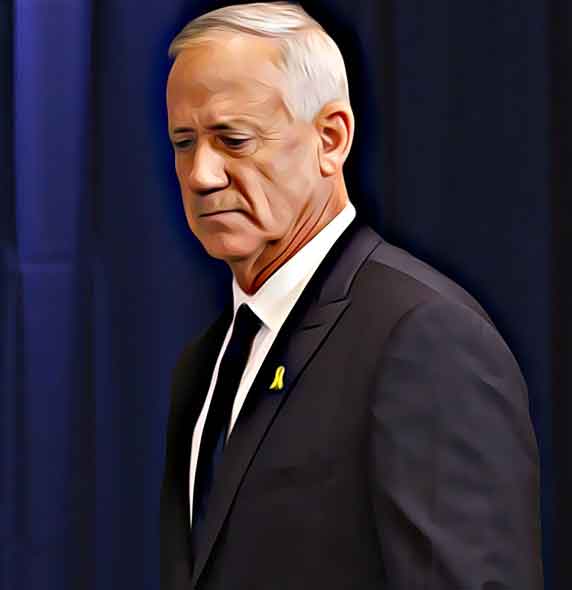
Benny Gantz's resignation from Israel's war cabinet appears dramatic from afar but is unlikely to alter the course of the conflict in Gaza or influence other key policies of Prime Minister Benjamin Netanyahu.
Gantz, a leader of the opposition and former military chief of staff, joined the emergency forum eight months ago after the deadly invasion by Hamas militants on Oct. 7, which triggered the ongoing conflict. As part of a three-person cabinet - alongside Netanyahu and Defense Minister Yoav Gallant - he had a seat at the table that would dictate the course of the response.
But his influence has appeared to diminish in recent times, and his departure reflects his frustration over that. He had said he would resign if Netanyahu didn't agree to a list of demands he issued last month, none of which were met.
"On the big decisions - normalization with Saudi Arabia, day-after options in Gaza, negotiations around hostages - Netanyahu is calling the shots and you won't see a change,” said Yohanan Plesner, a former parliamentarian who's president of the Israel Democracy Institute, a center-left think tank.
• Show of Unity
In the early weeks of the war, the trio made a show of unity, dressing alike in black and holding news conferences together. That hasn't happened in a long time, a reflection of their rivalries and differences.
No decision has yet been made about what will replace the war cabinet, aides to Netanyahu say. The likelihood is that some informal version of it will remain, with Strategic Affairs Minister Ron Dermer and Shas party leader Aryeh Deri playing prominent roles.
Far-right party leader Itamar Ben Gvir, part of Netanyahu's ruling coalition and aggressively pro-war, said Sunday he should be added to the cabinet in Gantz's place. That's unlikely to be agreed, as Netanyahu is known to dislike him and to consider his positions too extreme.
Gantz reiterated a call for new elections upon his departure but he can't force them to take place. Only if Netanyahu loses his majority - his coalition controls 64 out of 120 seats in parliament - will a vote occur before its scheduled occurrence in 2026.
For the past year, Gantz, 65, has polled ahead of Netanyahu as the favorite for the next prime minister partly because the Oct. 7 attack was such a security failure. Many in Israel are tired of Netanyahu, 74, the country's longest-serving premier who's under indictment for bribery and fraud.
But Gantz's lead has been slipping and some polls show Netanyahu ahead, with some Israelis angry at Gantz appearing to play politics at a time of war.
Anna Barsky, a political analyst for the centrist Maariv newspaper, said the landscape has shifted during the war and Gantz may no longer be welcomed with such open arms by those against Netanyahu. He will have to tussle with other opposition politicians - notably Yair Lapid and Avigdor Liberman - for a leadership role.
• US Confidant
Gantz had been acting as a kind of confidant of the US government, which has been pushing the Israeli cabinet to adopt more moderate policies regarding Gaza, such as protecting civilians, and agree to a cease-fire.
More than 36,000 Palestinians have been killed since Israel retaliated against the Hamas attacks, according to authorities in Hamas-run Gaza, who don't distinguish between fighters and civilians. Hamas, which is considered a terrorist organization by the US and European Union, killed about 1,200 Israelis on Oct. 7 and abducted 250 others.
Most analysts argue that US President Joe Biden and his lieutenants will continue to get their message to Netanyahu without Gantz as a conduit. Secretary of State Antony Blinken is due in Israel on Monday to meet with the prime minister. He is expected to meet with Gantz on Tuesday, according a senior State Department official.
One of Blinken's main goals is to persuade both Israel and Hamas to accept a cease-fire that would enable the exchange of hostages held in Gaza for Palestinian prisoners, allow much more aid to be delivered to the enclave and possibly bring about an end to the fighting. That's a prerequisite for diplomatic progress with Hezbollah, another Iran-backed group that's been trading fire with Israel across the Lebanese border.
Other US ambitions for the region include a formal diplomatic relationship between Saudi Arabia and Israel, which would then act as a bulwark against Iran and its military proxies such as Hamas and Hezbollah.
Netanyahu is in favor of such a deal but argues that Israel must first dismantle Hamas as a military and political entity, both in revenge for and to avoid a repeat of Oct. 7. Hamas wants a cease-fire deal only if it includes a guarantee that Israeli forces will withdraw from Gaza and war will end.
On Saturday, Israeli forces rescued four hostages held in central Gaza, lifting Israeli spirits, though it came at a high human cost - some 270 Palestinians were killed in the daytime raid, according to Hamas health authorities. Hamas issued a statement saying the operation killed three other hostages, but Israeli officials deny that.


 Contact The Editor
Contact The Editor
 Articles By This Author
Articles By This Author